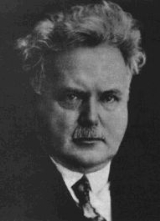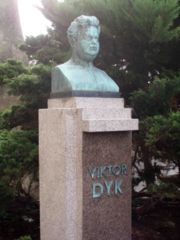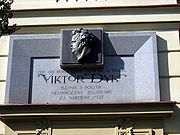
Viktor Dyk
Encyclopedia
Viktor Dyk (ˈvɪktor ˈdɪk) (December 31, 1877, Pšovka u Mělníka
, Austria-Hungary
– May 14, 1931, near the island of Lopud
, Yugoslavia
) was a well-known Czech
poet, prose writer, playwright, politician and political writer.
Viktor Dyk studied at a gymnasium
in Prague
(one of his teachers was Alois Jirásek
) and then at the Faculty of Law of Charles University in Prague
.
In 1911, he became involved in politics and joined the Státoprávně pokroková strana. During the First World War, he was imprisoned in Vienna
for his resistance activities against Austria-Hungary
. In 1918, he co-founded the Czechoslovak National Democratic Party (in Czech
: Československá národní demokracie).
His political views were conservative
and nationalist
. In the times of the First Republic of Czechoslovakia
, Viktor Dyk was one of the prominent intellectual opponents of the leftish president Tomáš Garrigue Masaryk.
Viktor Dyk died of a heart failure while swimming in the sea near the island of Lopud
.


Melnik
-Places:Bulgaria* Melnik, Bulgaria, a town in Bulgaria* Shiroka Melnishka Losa, a Bulgarian wine grape also known as MelnikCzech Republic* Mělník, a townUnited States* Melnik, Wisconsin, an unincorporated community...
, Austria-Hungary
Austria-Hungary
Austria-Hungary , more formally known as the Kingdoms and Lands Represented in the Imperial Council and the Lands of the Holy Hungarian Crown of Saint Stephen, was a constitutional monarchic union between the crowns of the Austrian Empire and the Kingdom of Hungary in...
– May 14, 1931, near the island of Lopud
Lopud
Lopud is a small island off the coast of Dalmatia, southern Croatia. Lopud is one of the Elaphiti Islands, and can be reached by boat from Dubrovnik, Orasac and Zaton. The island is famous for its sandy beaches, in particular the bay of Šunj....
, Yugoslavia
Yugoslavia
Yugoslavia refers to three political entities that existed successively on the western part of the Balkans during most of the 20th century....
) was a well-known Czech
Czech people
Czechs, or Czech people are a western Slavic people of Central Europe, living predominantly in the Czech Republic. Small populations of Czechs also live in Slovakia, Austria, the United States, the United Kingdom, Chile, Argentina, Canada, Germany, Russia and other countries...
poet, prose writer, playwright, politician and political writer.
Viktor Dyk studied at a gymnasium
Gymnasium (school)
A gymnasium is a type of school providing secondary education in some parts of Europe, comparable to English grammar schools or sixth form colleges and U.S. college preparatory high schools. The word γυμνάσιον was used in Ancient Greece, meaning a locality for both physical and intellectual...
in Prague
Prague
Prague is the capital and largest city of the Czech Republic. Situated in the north-west of the country on the Vltava river, the city is home to about 1.3 million people, while its metropolitan area is estimated to have a population of over 2.3 million...
(one of his teachers was Alois Jirásek
Alois Jirásek
Alois Jirásek was a Czech writer, author of historical novels and plays. Jirásek was a secondary-school teacher until his retirement in 1909. He wrote a series of historical novels imbued with faith in his nation and in progress toward freedom and justice...
) and then at the Faculty of Law of Charles University in Prague
Charles University in Prague
Charles University in Prague is the oldest and largest university in the Czech Republic. Founded in 1348, it was the first university in Central Europe and is also considered the earliest German university...
.
In 1911, he became involved in politics and joined the Státoprávně pokroková strana. During the First World War, he was imprisoned in Vienna
Vienna
Vienna is the capital and largest city of the Republic of Austria and one of the nine states of Austria. Vienna is Austria's primary city, with a population of about 1.723 million , and is by far the largest city in Austria, as well as its cultural, economic, and political centre...
for his resistance activities against Austria-Hungary
Austria-Hungary
Austria-Hungary , more formally known as the Kingdoms and Lands Represented in the Imperial Council and the Lands of the Holy Hungarian Crown of Saint Stephen, was a constitutional monarchic union between the crowns of the Austrian Empire and the Kingdom of Hungary in...
. In 1918, he co-founded the Czechoslovak National Democratic Party (in Czech
Czech language
Czech is a West Slavic language with about 12 million native speakers; it is the majority language in the Czech Republic and spoken by Czechs worldwide. The language was known as Bohemian in English until the late 19th century...
: Československá národní demokracie).
His political views were conservative
Conservatism
Conservatism is a political and social philosophy that promotes the maintenance of traditional institutions and supports, at the most, minimal and gradual change in society. Some conservatives seek to preserve things as they are, emphasizing stability and continuity, while others oppose modernism...
and nationalist
Nationalism
Nationalism is a political ideology that involves a strong identification of a group of individuals with a political entity defined in national terms, i.e. a nation. In the 'modernist' image of the nation, it is nationalism that creates national identity. There are various definitions for what...
. In the times of the First Republic of Czechoslovakia
First Republic of Czechoslovakia
-Independence:The Czechoslovak declaration of independence was published by the Czechoslovak National Council, signed by Masaryk, Štefánik and Beneš on October 18, 1918 in Paris, and proclaimed on October 28 in Prague...
, Viktor Dyk was one of the prominent intellectual opponents of the leftish president Tomáš Garrigue Masaryk.
Viktor Dyk died of a heart failure while swimming in the sea near the island of Lopud
Lopud
Lopud is a small island off the coast of Dalmatia, southern Croatia. Lopud is one of the Elaphiti Islands, and can be reached by boat from Dubrovnik, Orasac and Zaton. The island is famous for its sandy beaches, in particular the bay of Šunj....
.
Works


Poetry
- A porta inferi, 1897
- Síla života, 1898
- Marnosti, 1900
- Satiry a sarkasmy, 1905
- Milá sedmi loupežníků, 1906
- Pohádky z naší vesnice, 1910
- Giuseppe Moro, 1911
- Zápas Jiřího Macků, 1916
- Noci chiméry, 1917
- Devátá vlna 1930
- Lehké a těžké kroky 1915
- Anebo 1917
- Okno 1921
- Poslední rok 1922
Prose
- Stud, 1900
- Hučí jez a jiné prózy, 1903
- Konec Hackenschmidův, 1904
- Prosinec, 1906
- Prsty Habakukovy, 1906
- Píseň o vrbě, 1908
- Příhody, 1911
- Krysař, 1915
- Tajemná dobrodružství Alexeje Iványče Kozulinova, 1923
- Tichý dům, 1921
- Zlý vítr, 1922
- Prsty Habakukovy, 1925
- Můj přítel Čehona, 1925
- Dědivadelní hra, 1927
- Holoubek Kuzma, 1928
- Soykovy děti, 1929
Political literature
- Ad usum pana presidenta republiky (1929 – criticism of Edvard BenešEdvard BenešEdvard Beneš was a leader of the Czechoslovak independence movement, Minister of Foreign Affairs and the second President of Czechoslovakia. He was known to be a skilled diplomat.- Youth :...
and Tomáš Garrigue Masaryk - O národní stát (posthumously 1932–1938, 7 books od Dyk's political writing from 1917–1931)
Dramas
- Epizoda, 1906
- Posel, 1907
- Zmoudření Dona Quijota, 1913
- Veliký mág, 1914
- Zvěrstva, 1919
- Ondřej a drak, 1919
- Revoluční trilogie, 1921
- Napravený plukovník Švec, 1929 – support of Rudolf MedekRudolf MedekRudolf Medek was a Czech poet, army-related prose writer, and a general in the Czechoslovak Legions in Russia...
See also
- List of Czech writers
- The monument to Viktor Dyk near Dubrovnik, by Serbian architect Nikola Dobrović - http://hrcak.srce.hr/file/16559

